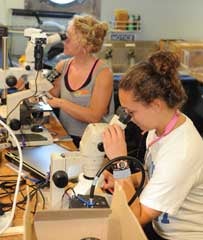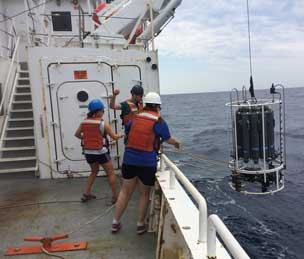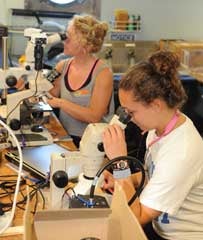 KINGSTON, R.I. – August 28, 2014 — Six University of Rhode Island undergraduate students got their first experience studying ocean ecology this month in a course that took them to the edge of the continental shelf aboard the URI research ship Endeavor. It was the first undergraduate class of its kind at URI, providing students with opportunities to study creatures living in the open ocean and learning to use oceanographic research equipment.
KINGSTON, R.I. – August 28, 2014 — Six University of Rhode Island undergraduate students got their first experience studying ocean ecology this month in a course that took them to the edge of the continental shelf aboard the URI research ship Endeavor. It was the first undergraduate class of its kind at URI, providing students with opportunities to study creatures living in the open ocean and learning to use oceanographic research equipment.
Taught by Brad Seibel, associate professor of biological sciences, the group spent a week of long days in a classroom and laboratory preparing for the trip – learning about the creatures they might see, discussing research papers, and learning how to collect data. They then boarded Endeavor and traveled 110 miles south-southeast to where the water was more than a mile deep.
“It couldn’t have gone any better,” said Seibel. “We were able to do all of our planned activities, the weather didn’t bother us much, all of the equipment worked, and everybody got home safely. The students had the time of their lives.”
Among the daily activities were scuba diving to collect specimens, trawling for fish as deep as 1,800 meters, jigging for squid, conducting measurements of the physical characteristics of the water column, and helping scientists from URI, Brown University and the University of Pennsylvania with their research.
“Animals in the open ocean are very different from those in closer to shore because they have nowhere to hide,” Seibel said. “They have all sorts of adaptations to live there. Many are gelatinous, which allows them to be neutrally buoyant, transparent or bioluminescent.”
 Among the animals the students captured were several varieties of bioluminescent squid, gulper eels whose jawbones are 10 times the length of their skull, a wide range of jellyfish relatives, and numerous microscopic organisms.
Among the animals the students captured were several varieties of bioluminescent squid, gulper eels whose jawbones are 10 times the length of their skull, a wide range of jellyfish relatives, and numerous microscopic organisms.
Senior marine biology major Katie Viducic enrolled in the class because it was a unique opportunity that would look good on her resume. She enjoyed the hands-on nature of the class and the chance to learn about all of the equipment used in oceanographic research.
“My favorite part was identifying and learning about the organisms we collected, which was also one of the most challenging parts because everything was so new to us,” said Viducic, a resident of Oakland, N.J., who is planning on a career studying sharks. “It was great to help out with some of the experiments the grad students were working on and learn about their projects.”
Michael Coppa agreed that it was challenging identifying the animals they caught in their nets, but that was also the part he liked the best. After 30 years as a helicopter pilot and air traffic controller, he finally had the chance to pursue the career he envisioned as a child — marine scientist. He reveled in the shipboard operations, from setting and retrieving the trawl net to deploying equipment to collect water samples at various depths.
“The most challenging part for me was the digestion and discussion of the scientific papers we were assigned,” said Coppa, a marine affairs major from North Kingstown. “The shipboard labor in setting and hauling the trawls and the extensive time spent in the lab identifying species were exhilarating, not taxing.”
For senior Jillon McGreal of Chatham, N.Y., the class was “amazing and rare.” And exhausting. She was surprised at how much she enjoyed the physical labor involved in working with the ship’s crew.
“I loved being right there hauling in the net, or steadying equipment with slip lines,” she said. “It was great to see how important teamwork is when deploying or recovering the nets. I also just loved looking out and seeing only water, and occasionally a Portuguese man-o-war.
“This experience just caused my love for the ocean and marine life to grow immensely,” she added. “Because of this class, I was able to make stronger connections with people in the professional marine biology world, and it became more clear to me that I want to continue on to graduate school and do research. I learned a lot about pelagic ecology, but the whole process of going on a research cruise was invaluable.”
The trip aboard the Endeavor was funded by the Rhode Island Endeavor Program, which provides URI researchers and local educators with access to the scientific research and educational capabilities of an ocean-going research vessel.
Pictured above
URI students Jillon McGreal and Jessica Freedman study microscopic organisms under microscopes aboard the R/V Endeavor. Photo by Brad Seibel
URI students enrolled in a class on ocean ecology launch a device to collect water samples at varying depths. Photo by Michael Coppa

